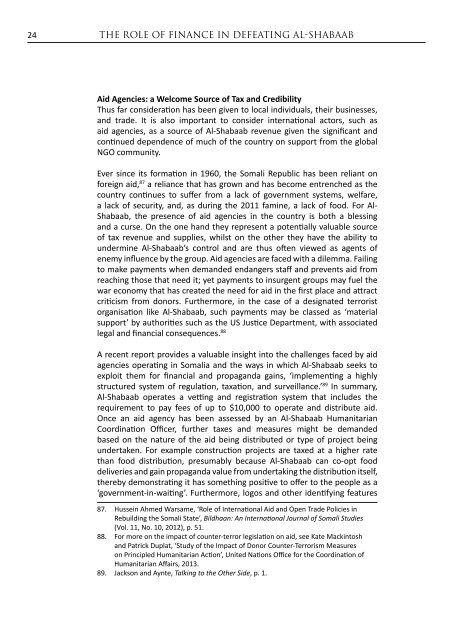Create successful ePaper yourself
Turn your PDF publications into a flip-book with our unique Google optimized e-Paper software.
24<br />
<strong>THE</strong> <strong>ROLE</strong> <strong>OF</strong> <strong>F<strong>IN</strong>ANCE</strong> <strong>IN</strong> DEFEAT<strong>IN</strong>G <strong>AL</strong>-<strong>SHABAAB</strong><br />
Aid Agencies: a Welcome Source of Tax and Credibility<br />
Thus far consideration has been given to local individuals, their businesses,<br />
and trade. It is also important to consider international actors, such as<br />
aid agencies, as a source of Al-Shabaab revenue given the significant and<br />
continued dependence of much of the country on support from the global<br />
NGO community.<br />
Ever since its formation in 1960, the Somali Republic has been reliant on<br />
foreign aid, 87 a reliance that has grown and has become entrenched as the<br />
country continues to suffer from a lack of government systems, welfare,<br />
a lack of security, and, as during the 2011 famine, a lack of food. For Al-<br />
Shabaab, the presence of aid agencies in the country is both a blessing<br />
and a curse. On the one hand they represent a potentially valuable source<br />
of tax revenue and supplies, whilst on the other they have the ability to<br />
undermine Al-Shabaab’s control and are thus often viewed as agents of<br />
enemy influence by the group. Aid agencies are faced with a dilemma. Failing<br />
to make payments when demanded endangers staff and prevents aid from<br />
reaching those that need it; yet payments to insurgent groups may fuel the<br />
war economy that has created the need for aid in the first place and attract<br />
criticism from donors. Furthermore, in the case of a designated terrorist<br />
organisation like Al-Shabaab, such payments may be classed as ‘material<br />
support’ by authorities such as the US Justice Department, with associated<br />
legal and financial consequences. 88<br />
A recent report provides a valuable insight into the challenges faced by aid<br />
agencies operating in Somalia and the ways in which Al-Shabaab seeks to<br />
exploit them for financial and propaganda gains, ‘implementing a highly<br />
structured system of regulation, taxation, and surveillance.’ 89 In summary,<br />
Al-Shabaab operates a vetting and registration system that includes the<br />
requirement to pay fees of up to $10,000 to operate and distribute aid.<br />
Once an aid agency has been assessed by an Al-Shabaab Humanitarian<br />
Coordination Officer, further taxes and measures might be demanded<br />
based on the nature of the aid being distributed or type of project being<br />
undertaken. For example construction projects are taxed at a higher rate<br />
than food distribution, presumably because Al-Shabaab can co-opt food<br />
deliveries and gain propaganda value from undertaking the distribution itself,<br />
thereby demonstrating it has something positive to offer to the people as a<br />
‘government-in-waiting’. Furthermore, logos and other identifying features<br />
87. Hussein Ahmed Warsame, ‘Role of International Aid and Open Trade Policies in<br />
Rebuilding the Somali State’, Bildhaan: An International Journal of Somali Studies<br />
(Vol. 11, No. 10, 2012), p. 51.<br />
88. For more on the impact of counter-terror legislation on aid, see Kate Mackintosh<br />
and Patrick Duplat, ‘Study of the Impact of Donor Counter-Terrorism Measures<br />
on Principled Humanitarian Action’, United Nations Office for the Coordination of<br />
Humanitarian Affairs, 2013.<br />
89. Jackson and Aynte, Talking to the Other Side, p. 1.


